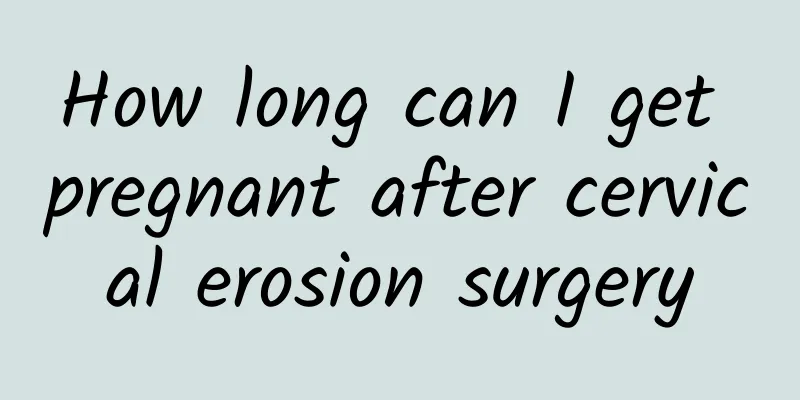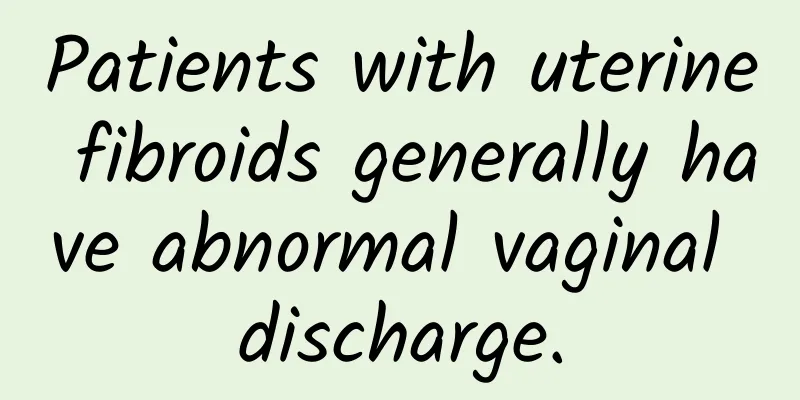What to eat after abortion to help the uterus recover What to eat after abortion to help the uterus recover

|
Abortion is a common gynecological surgery, and it may be a necessary choice for women in some special circumstances. However, the recovery of the uterus after surgery has become one of the focuses of women's concern. So, what should you eat after an abortion to help the uterus recover? 1. Eat a balanced diet After an abortion, you should maintain a balanced diet and take in adequate nutrition. You can increase the amount of foods rich in protein, vitamins and minerals, such as fish, beans, vegetables and fruits, to help speed up the recovery process of the uterus. 2. Eat foods containing probiotics Abortion surgery will have a certain impact on the body's immune system. Therefore, eating foods containing probiotics can help enhance immunity and regulate intestinal flora. Common foods containing probiotics include yogurt, yogurt drinks, etc. 3. Drink more water After an abortion, drinking water appropriately can help promote the discharge of toxins and keep the body's internal environment clean and stable. Drinking water should be evenly distributed throughout the day to avoid excessive drinking. In addition, drinking water can not only help the uterus recover, but also plays an important role in physical recovery. 4. Eat more fiber-rich foods Fiber-rich foods can help improve intestinal motility, promote defecation, and prevent constipation. Common fiber-rich foods include oats, whole wheat bread, vegetables, and fruits. Constipation is not only bad for your health, but also has a certain impact on uterine recovery, so it is very important to maintain good bowel habits. In summary, what should you eat after an abortion to help your uterus recover? First, you should maintain a balanced diet and take in adequate nutrition. Second, you can eat foods containing probiotics to enhance immunity and regulate intestinal flora. In addition, you should increase your water intake, as drinking more water can help eliminate toxins and promote physical recovery. Finally, you should eat more fiber-rich foods to improve intestinal motility and prevent constipation. The recovery of the uterus after abortion is a process that takes time, and dietary adjustment is only one aspect of it. In daily life, you should also pay attention to proper rest, avoid strenuous exercise and heavy lifting, so as not to adversely affect the recovery of the uterus. At the same time, if there are abnormal conditions, such as persistent abdominal pain, heavy bleeding, etc., you should seek medical attention in time. Only by paying full attention to the conditioning and protection of the body can the uterus recover as soon as possible. |
Recommend
Is it possible to cure adenomyosis?
Some diseases can be cured, but many cannot. Aden...
When it comes to eating fruits to supplement iron, are black grapes the best choice? Big misunderstanding...
As the temperature drops, symptoms such as cold h...
How to regulate the diet of patients with dysmenorrhea
For patients with dysmenorrhea, how to regulate d...
Drinking lemon water in spring can easily detoxify and reduce fat
When you go to the toilet for the first time afte...
What to do with diet if you have Bartholinitis
For adult women, gynecological diseases have alwa...
Is abdominal bloating a symptom of adnexitis?
Is abdominal bloating a symptom of adnexitis? 1. ...
Office workers relieve stress by eating more snacks and getting fatter! Eat these 10 snacks to satisfy your hunger without getting fat
Office workers are under great pressure at work. ...
What can I eat to make my uterine fibroids smaller? What can I eat to prevent my uterine fibroids from getting bigger?
Uterine fibroids are a common gynecological disea...
Eating turmeric can help you lose weight and lower blood lipids ~ Chinese medicine: These 5 types of people should not eat it wrong
As the trend of keeping in good health rises, man...
The use of drugs for threatened abortion should be scientific and reasonable
Threatened abortion reminds expectant mothers to ...
Can women who have had abortions be checked? What should women do after abortions?
In today's society, many young people get pre...
Can amenorrhea during childbearing age be cured?
The childbearing age is a stage that Chinese wome...
What is the reason for excessive female flow? Women can take these 5 medicines for irregular menstruation
Women's menstrual volume, many people either ...
Does uterine fibroids require surgery? What is the best thing to eat after uterine fibroid surgery?
Uterine fibroids, also known as uterine leiomyoma...
What should I do if I have back pain during menstruation? Never hit your waist
Some women often experience back pain during or b...









